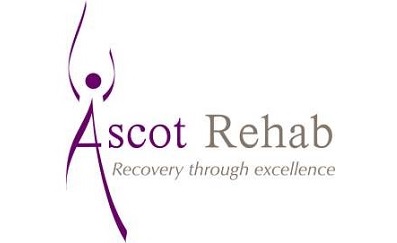Ascot Rehab sees “outstanding results” with the Hocoma ArmeoSpring
Case Study
Ascot Rehab is a leading neurorehabilitation provider for patients who have traumatic brain injuries and other neurological conditions, offering inpatient, outpatient and outreach services in London and Surrey. In a recent Quality Report, Ascot Rehab described seeing “outstanding results” with the ArmeoSpring, which is a robotic upper limb rehabilitation device for impaired hand, arm and shoulder movement developed by Hocoma.
Ascot Rehab explores using the ArmeoSpring in conjunction with traditional therapy in this case study featured below.
Get in touch with Summit Medical and Scientific to register your interest for a trial with the ArmeoSpring.
You can view Ascot Rehab’s full research poster for this case study here.
Introduction
Exoskeletons for lower and upper extremities have been introduced in neurorehabilitation because they can guide the patient’s limb following its anatomy, covering many degrees of freedom and most of its natural workspace.
This emerging technology enables independent and repetitive movement practice in a motivating, enriched and interactive virtual learning environment.
High intensity training is one of the key determinants of motor recovery which robotic therapy can offer. When combined with conventional therapy, robotic therapy yields largely favourable outcomes in terms of improving motor control, reducing motor deficits, and increasing ability to carry out activities of daily living.
Case presentation
Jon is a 66 year old chef. He used to cycle to work on a daily basis. Jon suffered a road traffic accident while cycling to work in October 2015. From the accident resulted polytrauma with maxillofacial, costal and spinal fractures, injury to right thigh, right rotator cuff injury, and no evidence of head injury.
Jon was admitted at Ascot Rehab in July 2017 for a 3 week intense rehab period prior to his reverse shoulder replacement. The therapy input during his stay was focused on:
- Facial exercises to promote symmetry
- Anxiety management
- Hydrotherapy, exercise group and outdoor mobility, getting up off the floor
- Bath transfers and equipment provision, dressing practise
- Cooking and use of his right upper limb
- Armeo for AROM
- Home exercise programme
Jon was referred as an outpatient to Ascot Rehabilitation for Occupational Therapy and Physiotherapy input following a reverse right shoulder surgery. He attended twice a week over 4 months.
On admission, Jon’s functional assessment revealed that:
- He needed assistance to manage socks and shoes
- Required supervision to shower
- Not able to undertake domestic tasks
- Increased fear of falling which limits his outdoor mobility
- Pain increased after surgery
- Less positive mood as feeling more dependent on his wife
Jon’s goals:
- To be able to return to driving
- To be able to eat peas holding a spoon in his right hand
Jon’s intervention included:
- Hocoma ArmeoSpring
- Muscle strengthening
- Prevent loss of range
- Improve range of movement
- Pain management
- Promote alignment and optimal positioning
- ADL practise – chopping and carrying pans, dressing
Results
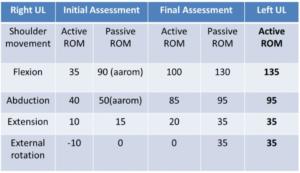
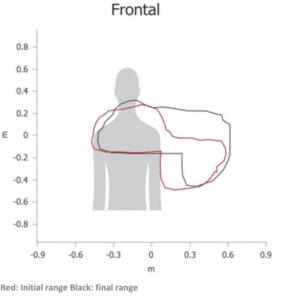
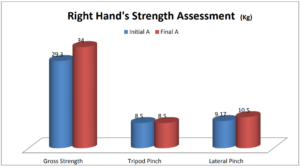
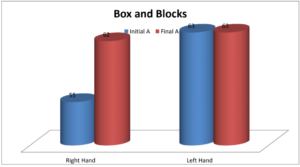
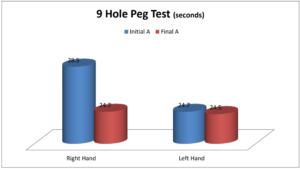
At discharge Jon no longer feared falling and damaging his shoulder. He is currently mobilising independently and is aware that he needs to plan his outdoor mobility to incorporate rest breaks. Jon’s main goal was to return to driving. He has already investigated which vehicle to purchase and was keen to drive again.
Following his outpatient rehabilitation Jon is now independent again with dressing tasks but finds tucking the shirt into the back of his trouser a challenge due to reduced right shoulder external rotation. Jon has returned to cooking his family meals and feels his ability to chop is improving. This has had a positive effect on his mood and independence.
A year later Jon has returned to driving and to previous leisure time interests like swimming.
Conclusion
The results of the present pilot study suggest that upper limb functionality can be positively influenced by robotic therapy combined with a traditional therapy program.
Contact
To contact Ascot Rehab, visit www.ascotrehab.com, email info@ascotrehab.com or phone +44 203 212 0839.

